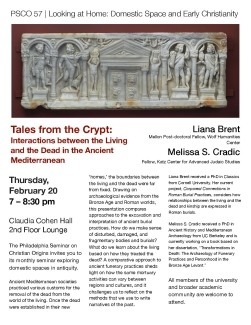We are delighted to invite you to the first spring semester meeting of the Philadelphia Seminar on Christian Origins on Thursday, February 20 in Claudia Cohen Hall. As part of our broader conversation about home life in the ancient world, we will be welcoming Dr. Liana Brent and Dr. Melissa S. Cradic, who will be presenting about “Tales from the Crypt: Interactions between the Living and the Dead in the Ancient Mediterranean.” They have provided the following abstract for their talk:
Ancient Mediterranean societies practiced various customs for the removal of the dead from the world of the living. Once the dead were established in their new ‘homes,’ the boundaries between the living and the dead were far from fixed. Drawing on archaeological evidence from the Bronze Age and Roman worlds, this presentation compares approaches to the excavation and interpretation of ancient burial practices. How do we make sense of disturbed, damaged, and fragmentary bodies and burials? What do we learn about the living based on how they treated the dead? A comparative approach to ancient funerary practices sheds light on how the same mortuary activities can vary between regions and cultures, and it challenges us to reflect on the methods that we use to write narratives of the past.
Per our custom, the seminar will run from 7:00-8:30 PM in the 2nd floor lounge of Claudia Cohen Hall, with an informal dinner in Houston Hall beforehand at 6pm. Please RSVP to Theodora Naqvi (
tnaqvi@sas.upenn.edu) or Jill Stinchcomb (
jstin@sas.upenn.edu). **Please note: Claudia Cohen Hall has increased security measures this year which includes doors that are locked to those who do not have a Penn ID card. If you anticipate having trouble entering the building, email Jill or Theodora and we will make sure everything is sorted. There will be someone waiting at the doors from 6:50-7:00 to let guests in.**
See you on the 20th!
See below for more information about this year's theme:
For the 2019-2020 year, the Philadelphia Seminar on Christian Origins will explore home life and the domestic in conjunction with religious identity. Recent scholarship has interrogated the traditional demarcation between the public and the private, opening fresh ground for conversation about religious practice and privacy that sidesteps discourses of interiority. This year, PSCO hopes to integrate archaeological, anthropological, and textual data which give diverse portraits of domestic life in the ancient world.
This year, we hope to ask questions such as: Who is included in “the household,” and how do ideas of kinship overlap (or not) with the category of the home? How did the home lives of early Christians look similar to or different from their neighbors? Were Christians remarkable or unique in how they approached domestic issues? How did the emergence of Christianity affect discourses of oikos and oikumene in the Greco-Roman world? What types of variation are visible between Christians of different geographic and cultural locales, and between Christians and others in the same locale?

